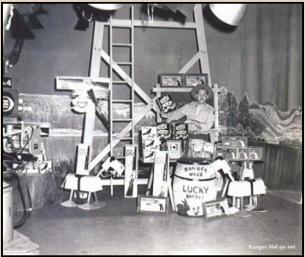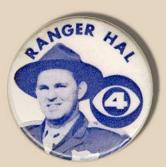Forget electricity and plumbing. If you were a little boy in Jacksonville 50 years ago, you knew that when you grew up, the coolest place to live would be a forest ranger's tower.
It was good enough for Ranger Hal.
If 50-somethings raised in Jacksonville dig deep in their memories, they can probably pass the following trivia quiz:
1) Complete the following rhyme: "Birds and rabbits, possum, deer, make..."
2) Why should you listen to your mom and dad?
The answer to the first question is "the magic line appear." The answer to the second is because "they're your best friends."
That was from actor Henry Baranek's daily mantra as he ended his Ranger Hal kiddies' TV show on Jacksonville's WJXT Channel 4 weekday mornings from 1958-69. "Be good, have a happy birthday, get well soon and be sure to listen to Mom and Dad, they're your best friends. And remember, it's great to be an American." Then he would climb the ladder back up to the ranger tower, and it was time to go school.
It wasn't much of a climb. the ladder was in a studio, led nowhere and was 12 feet high, tall enough to get him on and off camera. The Ranger would begin the show 45 minutes earlier by descending the same ladder. Between his vertical entrance and exit, there were Crusader Rabbit cartoons; filmed "adventures" from North Florida locales; old-fashioned Vaudeville shtick; "how to" instructional segments; educational films (notably Journey to the Beginning of Time); a little huckstering of sponsor products and the magic drawing board, where the aforementioned "birds and rabbits" rhyme would introduce a "magic line" of handless chalk on a blackboard that would draw a little more of an image each day. Kids would try to guess what was being drawn in an effort to win a prize.
But the main attraction was the Ranger himself, and rarely was a man more suited to his job. Baranek genuinely loved children, as his four sons and daughter well remember. He was game for any stunt or physical challenge, appreciated jokes both verbal and practical, was experienced in all phases of broadcasting and tirelessly promoted his image and program.
Born in Allentown, Pennsylvania, Baranek served in the Air Force as an Armed Forces radio disc jockey. Recalled to the ranks for the Korean War, he met his wife, the former Sandy Knight, at a Service Club dance in her hometown of Hampton, Virginia.
"I didn't like him at first," she recalled recently from her Ponte Vedra home. "He seemed egotistical. It's because he was a fabulous dancer and all the girls wanted to dance with him. He had his pick."
Eventually, he picked her and they married. Baranek went to work on a Richmond morning television show from 1955-57, then was laid off. The young couple stayed with relatives of Sandy's in Hialeah, Florida, while Henry sent his resume out all over the country. Eventually, he was hired by Jacksonville's Channel 4 and moved her in August 1957, to do the weather and public service announcements.
In 1958, the Captain Kangaroo morning children's show went on a 13-week hiatus. Needing a temporary program to fill the slot, WJXT -- which was owned by The Washington Post -- copied an idea from a Washington, D.C., program called Ranger Hal, in which a friendly forest ranger entertained and educated the kids. Though dozens of markets had a version of the Popeye cartoon show -- in Jacksonville it was called Popeye's Pals -- and many had a Romper Room or Bozo the Clown show, Washington and Jacksonville were the only two markets with a Ranger Hal.
Jacksonville's Ranger Hal, as portrayed by Henry Baranek, was an instant hit and received 7,000 fan letters after the first broadcast. When Captain Kangaroo returned, Ranger Hal was retained and moved from 8 AM to 7:05. Ranger Hal's ratings remained high through 1969, when the show was cancelled because new management at Channel 4 decided -- as new management often does -- to go in a different direction.
Baranek's show was on long enough to become a local institution. Just about everyone saw it...except Mrs. Ranger Hal.
"The kids watched it," Sandy Baranek recalls. "I was too busy making their breakfasts and getting them dressed and ready to go to school."
There are five Baranek children -- Steven, David, Thomas, Diane, and Patrick. David, who currently lives in Burke, Virginia, is a retired Naval aviator who taught at the Navy's Top Gun fighter plane school when the famous movie starring Tom Cruise was filmed there. He is the author of an upcoming book called Topgun Days. He also maintains a website on Ranger Hal that is more extensive than that of many heads of state.
On the website are videos of "Ranger Hal adventures," which, in retrospect, were the highlight of the program. The Ranger, wearing his familiar Smokey Bear hat and uniform, would water ski with the bathing beauties at Cypress Gardens, fly with the Blue Angels, skydive at Herlong Field, feed dolphins at Marineland or take a spin around the Daytona International Speedway -- making sure, of course, that his ranger hat was placed on top of the crash helmet. He was educating his young audience about the area in which they lived, but he was doing it at a certain risk to himself.
"Dad was an athlete," David Baranek says. "Athletes do athletic things. If he were a singer or an artists, he would have done that."
"Are you kidding? I was a nervous wreck," says Sandy Baranek. "I had three children at the time and he's jumping out of an airplane. He landed badly and hurt himself, but he thought it was fabulous. He did a lot of silly things, but he took his role in life very seriously."
"At one point, we were sponsored by the Florida Tourism Commission," recalls Tom Baranek of Madison, North Carolina, who, like his brother David became a Navy aviator. "We went to every alligator farm and monkey jungle down A1A. I got to ride on a Galapagos turtle. What a summer that was."
Participating in the local attractions rather than just filming them added to the show's educational value, says David Nelson, a 30-year teacher in the Duval County school system who recently watched David Baranek's video collection.
"He brought the kids into it," Nelson explains. "It becomes an experience."
The Ranger's sense of humor comes through. in one video, interviewing a talented teenaged tennis player, the film cuts to the boy's serve then to the Ranger with a tennis ball stuffed in his mouth. He was funny away from the camera, too.
"The station made life-sized photos of each of us for display at the annual agriculture fair," recalls Channel 4 weatherman George Winterling. "one evening Henry placed his photo in the dark closet where the custodian kept his cleaning supplies. The large image was facing the door early the next morning when the custodian, being the only person in the building, opened the door. He nearly jumped out of his skin!"
Former Jacksonville Mayor Jake Godbold recalls the Ranger's support for civic and charity projects, which he would not only plug on his show but also attend and often host.
"I liked to call him 'The Lone Ranger,'" Godbold says. "He was the ranger that rode in on a white horse and helped the town."
Godbold attended Henry Baranek's funeral in 1979. Ranger Hal died young, of heart tumors, at age 51, and that came after some tough years.
When the show was cancelled, another entertainment job was out. He was typecast as Ranger Hal. He played the role of Ronald McDonald for the hamburger chain briefly, but too many kids recognized his voice under the clown makeup: "You're not Ronal McDonald, you're Ranger Hal."
He spent two years looking for steady work. In a 1978 interview with The Florida Times-Union Baranek said, "I realized my image was bad." Prospective employers assumed he was a big TV star unwilling to work hard. Finally he found fulltime employment as a safety inspector for a paper mill and later became a successful traveling salesman.
When he gave that '78 interview, he was dying, though he insisted his wife didn't mention it or tell the children. Given six months to live in 1977, Baranek agreed to a then-experimental radiation treatment that bought him two more years. When the tumors came back, they came with a vengeance.
"He got home from a sales trip on a Thursday feeling sick and by Sunday he was gone," his widow remembers. "So Henry worked right up to the end. He raised five successful children. That's a great legacy."

